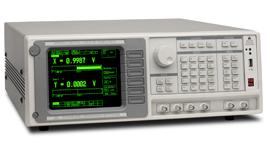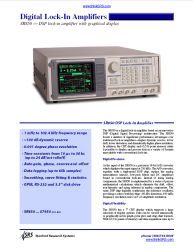Stanford SR850 100kHz DSP Lock-in Amplifier

Stanford SR850 100kHz DSP Lock-in Amplifier
Boasts a number of significant performance advantages over traditional lock-in amplifiers

The SR850 is a digital lock-in amplifier based on an innovative DSP (Digital Signal Processing) architecture. The SR850 boasts a number of significant performance advantages over traditional lock-in amplifiers - higher dynamic reserve, lower drift, lower distortion and dramatically higher phase resolution. In addition the CRT display and 65,536 point memory make it possible to display and procss data in a variety of formats unavailable with conventional lock-ins.
Features:
- 1mHz to 102.4kHz frequency range
- >100dB dynamic reserve
- 0.001 degree phase resolution
- Time constants from 10μs to 30ks (up to 24dB/oct rolloff)
- Auto-gain, -phase, -reserve and -offset
- Data logging (up to 65k samples)
- Smoothing, curve fitting and statistics
- GPIB and RS232
At the input of the SR850 is a precision 18-bit A/D converter which digitises the input signal at 256kHz. The A/D converter, together with a high-speed DSP chip, replace the analog demodulator (mixer), low-pass filters and DC amplifiers found in conventional lock-ins. Instead of using analog components, the SR850 is implemented by a series of precise mathematical calculations which eliminates the drift, offset, nonlinearity and aging inherent in analog components. The same DSP chip digitally synthesises the reference oscillator, providing a source with less than -80dBc distortion, 100mHz frequency resolution, and 2mV of amplitude resolution.
For further information please contact us or download the datasheet.

